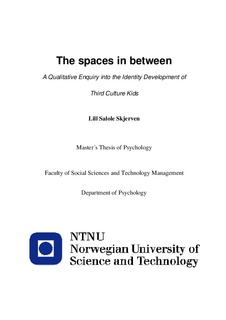| dc.description.abstract | Over the last few decades there has been an increasing focus on the role of culture in child development, aspects of development within cross-cultural psychology, as well reflections on the components of identity in a rapidly increasing globalised world. Influenced by these currents, this dissertation is an inquiry into the identity experiences of children who move cross-culturally, along with their parents, during their developmental years (Third Culture Kids).
The aim of this thesis was to explore how exposure to multiple cultural influences and frequent mobility during the formative years affects the identity development of adolescence. The first chapters present the topic and theoretical background for the study. The third chapter reviews the methodological direction of the study, and provides a detailed description of the research procedure. Chapter four and five present and discuss the findings of the investigation.
The design used for the research project was Interpretative Phenomenological Analysis (IPA), and the interview sample consisted of ten adolescents/young adults who had spent part of or all of their childhood years commuting between various societies. There were three main findings drawn out of the analysis and extended through the discussion on the material. One of the findings was that the interviewees represented three different identity outcomes, indicating an individual structuring of the common components in their background. The second finding was that their status appeared to match the responses they received from others and their ability to reference their experiences. Finally, the way in which the informants viewed themselves appeared to form a consistent life narrative across time and place. These findings can be said to imply a need to expand the available understandings of identity development in a multifaceted setting, both within psychological frameworks as well as in society as a whole. | nb_NO |
